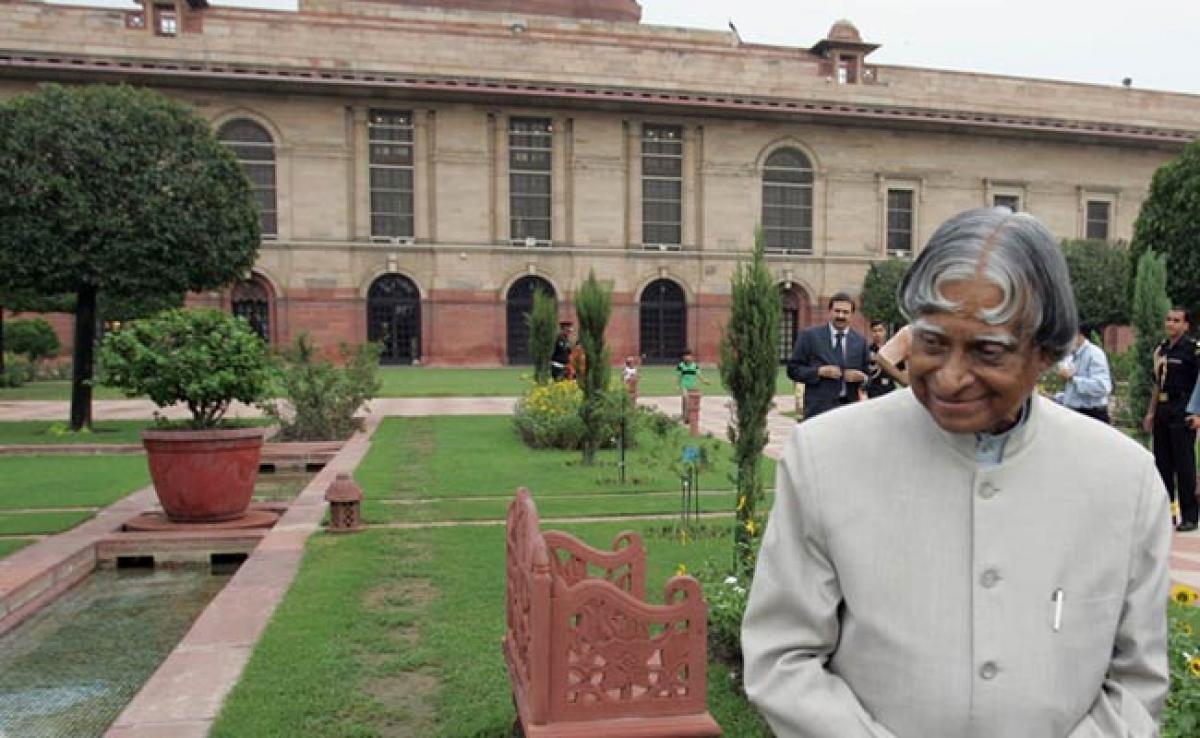Live
- Chanchalguda Jail Officials Say They Haven't Received Bail Papers Yet, Allu Arjun May Stay in Jail Tonight
- BJP leaders present evidence of illegal voters in Delhi, urge EC for swift action
- Exams will not be cancelled: BPSC chairman
- Nagesh Trophy: Karnataka, T.N win in Group A; Bihar, Rajasthan triumph in Group B
- YS Jagan condemns the arrest of Allu Arjun
- Economic and digital corridors to maritime connectivity, India and Italy building vision for future, says Italian Ambassador
- SMAT 2024: Patidar's heroics guide Madhya Pradesh to final after 13 years
- CCPA issues notices to 17 entities for violating direct selling rules
- Mamata expresses satisfaction over speedy conviction in minor girl rape-murder case
- Transparent Survey Process for Indiramma Housing Scheme Directed by District Collector
Just In

x
Highlights
A global satellite for earth observation and disaster risk reduction -- GlobalSat for DRR -- proposed under the UN framework is to be dedicated to APJ Abdul Kalam as a tribute to the vision of the celebrated rocket scientist and former Indian president who died July 27.
A global satellite for earth observation and disaster risk reduction -- GlobalSat for DRR -- proposed under the UN framework is to be dedicated to APJ Abdul Kalam as a tribute to the vision of the celebrated rocket scientist and former Indian president who died July 27.

This has been stated by Milind Pimprikar, Chairman of CANEUS (CANada-EUrope-US-ASia) Organization on Space Technologies for Societal Applications headquartered in Montreal, Canada.
Founded in 1999, CANEUS serves to develop a common platform for space technology solutions for natural and man-made disaster management. The "GlobalSat for DRR" is a UN-driven global initiative on sharing space technology for disaster risk reduction, Mr Pimprikar told IANS.
Launch of this satellite was mooted at the third UN World Conference on Disaster Risk Reduction held at Sendai in Japan this March.
The concept was initiated by CANEUS in cooperation with UN agencies including the UN Office for Outer Space Affairs, the UN International Strategy for Disaster Reduction, the United Nations Development Programme and the World Bank.
The GlobalSat was proposed in response to the need for a globally interconnected disaster and environmental management system since no single country can afford to develop a complete set of sensors and satellite systems needed for forecasting, monitoring and mitigating disasters like floods, drought, typhoons, earthquakes, wild fires, windstorms, or tidal events, Mr Pimprikar said.
The UN-led GlobalSat will provide a common platform that will allow sharing of space and data segments, with an ability to serve individual nation's disaster management and development needs.
Mr Pimprikar said the goals of UN GlobatSat are the same as those of Dr Kalam. In his "World Space Vision-2050" Kalam had envisaged space faring nations joining hands to find solutions to mankind's major problems such as natural disasters, energy and water scarcity, health-care education issues and weather prediction.
"Therefore we now plan to dedicate the UN GlobalSat initiative as a tribute to Late Dr Abdul Kalam by renaming it "UN Kalam GlobalSat", Mr Pimprikar said.
Mr Pimprikar hoped the renaming will inspire the next generation of scientists, engineers and space explorers to foster innovation and entrepreneurship and pooling of resources to find low-cost solutions to major problems facing mankind.
Mr Pimprikar said the recommendations made at the Sendai conference including the proposed GlobalSat will be formally adopted by more than 150 world leaders at the UN Session in New York in September that Prime Minister Narendra Modi is slated to attend.
Noting that PM Modi has already proposed an Indian initiative for a dedicated satellite for the SAARC (South Asian Association for Regional Cooperation) countries. Mr Pimprikar said India, "as a leading space nation in the world, has the unique opportunity to champion and lead the proposed "UN GlobalSat" initiative at the UN Session.
"Respecting India's leadership, other nations from across the globe will support it wholeheartedly to seek formal UN endorsement of "UN Kalam GlobalSat", he said.
After the formal approval, the UN Office for Outer Space Affairs will work out the details that can be addressed and finalised for implementation at the proposed UN-India Workshop in early 2016, he said.
The eventual goal of this satellite, he said, "is to establish a public/private partnership that would create a low-cost, internationally shared data collection and distribution backbone in space with no barriers to entry for participating nations."

Next Story
More Stories
ADVERTISEMENT
© 2024 Hyderabad Media House Limited/The Hans India. All rights reserved. Powered by hocalwire.com







